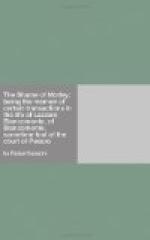From those words of hers I inferred, as perhaps she meant I should, that once she left Pesaro to obey her father’s summons, our little northern state was to know her no more. Once again, only, did I see her, on the occasion of her departure, some four days later, and then but for a moment. Back to Pesaro she came no more, as you shall learn anon; but behind her she left a sweet and fragrant memory, which still endures though many years are sped and much calumny has been heaped upon her name.
I might pause here to make some attempt at refuting the base falsehoods that had been bruited by that time-serving vassal Guicciardini, and others of his kidney, whom the upstart Cardinal Giuliano della Rovere—sometime pedlar—in his jealous fury at seeing the coveted pontificate pass into the family of Borgia, bought and hired to do his loathsome work of calumny and besmirch the fame of as sweet a lady as Italy has known. But this poor chronicle of mine is rather concerned with the history of Madonna Paola di Santafior, and it were a divergence well-nigh unpardonable to set my pen at present to that other task. Moreover, there is scarce the need. If any there be who doubt me, or if future generations should fall into the error of lending credence to the lies of that villain Guicciardini, of that arch-villain Giuliano della Rovere, or of other smaller fry who have lent their helot’s pens to weave mendacious records of her life, dubbing her murderess, adulteress, and Heaven knows what besides—I will but refer them to the archives of Ferrara, whose Duchess she became at the age of one-and-twenty, and where she reigned for eighteen years. There shall it be found recorded that she was an exemplary, God-fearing woman; a faithful and honoured wife; a wise, devoted mother; and a princess, beloved and esteemed by her people for her piety, her charity and her wisdom. If such records as are there to be read by earnest seekers after truth be not sufficient to convince, and to reveal those others whom I have named in the light of their true baseness, then were it idle for me to set up in these pages a passing refutation of the falsehoods which it has grieved me so often to hear repeated.
It was two days later that the Lord Giovanni set out for Rome, obedient to the command he had received. But before his departure—on the eve of it, to be precise—there arrived at Pesaro a very wonderful and handsome gentleman. This was the brother of Madonna Paola, the High and Mighty Lord Filippo di Santafior. He had had a hint in Rome that his connivance at his sister’s defiant escape was suspected at the Vatican, and he had wisely determined that his health would thrive better in a northern climate for a while.
A very splendid creature was this Lord Filippo, all shimmering velvet, gleaming jewels, costly furs and glittering gold. His face was effeminate, though finely featured, and resembled, in much, his sister’s. He rode a cream-coloured horse, which seemed to have been steeped in musk, so strongly was it scented. But of all his affectations the one with which I as taken most was to see one of his grooms approach him when he dismounted, to dust his wondrous clothes down to his shoes, which he wore in the splayed fashion set by the late King of France who was blessed with twelve toes on each of his deformed feet.




